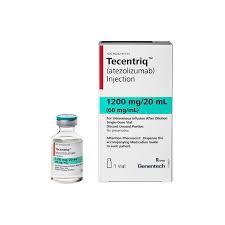Roche Korea has received approval from the Ministry of Food and Drug Safety for a combination treatment consisting of Tecentriq and chemotherapy as the first immunotherapy to treat small cell lung cancer (SCLC).

SCLC is a carcinoma that has had a high unmet medical need for the past 20 years as there were no treatment options other than chemotherapy. Due to the high malignancy and poor treatment prognosis, the five-year survival rate is 6.5 percent, only a quarter of that of non-small cell lung cancer (NSCLC).
Tecentriq combination therapy, which had demonstrated more than one year of overall survival (OS) in SCLC, had received a recommendation as Category 1 in the National Comprehensive Cancer Network guidelines.
The ministry approved the combination based on the results of a multicenter, randomized, double-blind, placebo-controlled phase 3 IMpower133 clinical study, which validated the efficacy and safety of Tecentriq combination therapy in 403 patients with advanced-stage SCLC.
The results showed that the median OS for Tecentriq combination therapy was 12.3 months, and reduced the risk of death by 30 percent compared to the control group. Also, 51.7 percent of patients receiving the combination had a one-year survival rate.
The safety profile of the therapy was consistent with previously reported safety profiles for individual drugs.
“We are pleased to offer new anticancer drug-based treatment options for patients with SCLC who have not had access to new treatment options for a long time,” Roche Korea CEO Nic Horridge said. “As Roche has built a 360-degree lung cancer care portfolio that encompasses non-small cell lung cancer SCLC through four treatments and various indications, we will continue our efforts to provide more diverse and innovative treatment options for Korean lung cancer patients.”
Professor Kim Sang-we at Asan Medical Center also said, “SCLC has a smaller number of patients than NSCLC, and has a large unmet medical need among patients and medical staff due to the rapid growth of tumors and poor prognosis.”
The emergence of immunotherapy that provides a survival rate of more than one year for SCLC is encouraging for the development of lung cancer treatment, Kim added.

